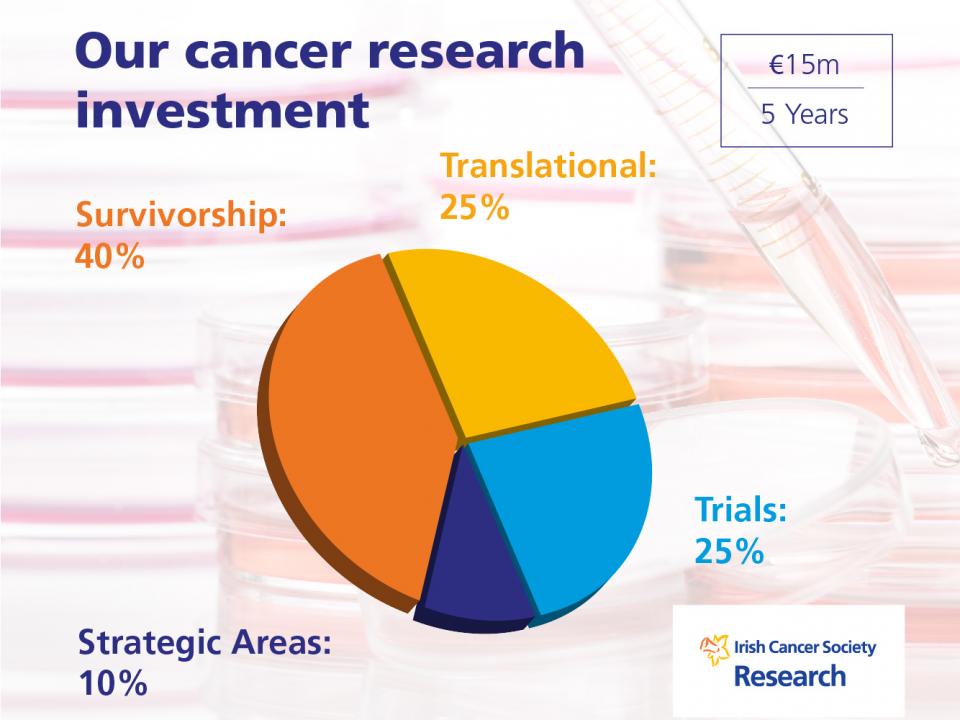
While not as immediately obvious as many other consequences of this pandemic that has touched every aspect of our lives, the sudden and sharp fall in cancer research activity it has caused must surely rank among the most stark and concerning.
Cancer clinical trials and research studies offer vital hope for better and more effective treatments that can prove life-changing for so many. But these past 14 months have presented a challenge like no other to the sector and all who work in it.
Nearly 45% less patients are being recruited for clinical trials so important to the development of innovative new medicines and methods of care, new figures from our partners at Cancer Trials Ireland show.
While we strive to give 1 in every 16 new cancer patients access to clinical trials, this is currently running at closer to 1 in 100. Put simply, less patients are getting on trials that could present a lifeline for some who will have tried all other available treatment options without success.
Overall it is estimated that research activity dropped by more than half last year. A cancer research ‘gap’ has emerged, one that will take considerable effort to close.
This worrying decline has been brought about by a number of issues.
From last March universities were closed for extended periods. Indeed, some of the equipment, materials and expertise used for cancer research became crucial in supporting COVID-19 testing and tracing efforts but due to the ongoing necessary restrictions, access to these tools and spaces for their original intended purpose remains limited.
Hospitals redeployed clinical research staff and facilities to shore up urgent services, and with many non-critical consultations and meetings now happening virtually it has become difficult to recruit patients for trials and related activities.
At the same time we know the clinical leaders at the forefront of cutting-edge trials are feeling exhausted, with a new survey of oncologists conducted by Cancer Trials Ireland showing that over three quarters were feeling ‘burned out’ or ‘overwhelmed’, with the pandemic a significant contributing factor towards this pervasive sense of fatigue.
Cancer numbers were already growing as our population gets older but the pandemic will result in even more cancer and later diagnoses. Research is the only way to find new solutions and improvements to care and treatment, and so now like never before we must support the research community in our country to explore all means of addressing the profound challenges caused for those who are or will be affected by a cancer diagnosis.

A €15 million investment plan into cancer research over the next five years announced today by the Irish Cancer Society will help to claw back lost ground, but on its own it will not be enough.
Instead, all stakeholders across the State, industry and charities such as ourselves should strive to raise the bar once more in seeking to further this country’s proud yet often underappreciated tradition of world-leading cancer discoveries and breakthroughs.
For example while many know of the critical importance of radiation treatment, few Irish people are likely aware that the very concept of using radiation to kill cancer cells came from the “Dublin method” developed by researchers in Trinity College a century ago.
Many patients being treated for breast cancer around the world rely on medicine developed in part by investigators here and our rich research diaspora at leading cancer centres around the world, and up to two-thirds of those with early forms of breast cancer can now avoid chemotherapy due to a test that came about from collaboration between Irish hospitals and partner institutes globally.
The truth is that few of us are conscious of the quiet efforts of our research community to improve our odds of surviving cancer and living full and fulfilling lives after it, until we encounter the disease ourselves.
From Letterkenny to Cork, in centres all over Ireland our researchers are still tackling the biggest problems in cancer care, like helping women whose cancer treatment has taken a drastic toll on their bodies, or giving patients access to emerging treatments for perennially overlooked forms of the disease.
If we are to overcome the monumental adversity of the last year we must be more ambitious than ever in our outlook. Nowhere is this dedication more necessary than in the area of cancer research, and the next few years are critically important for regaining momentum towards the achievable goal of an Ireland where no-one dies from cancer.
The work of Irish Cancer Society funded researchers is made possible through the kind support of the public.
To help support our cancer research please visit www.Cancer.ie/Donate
